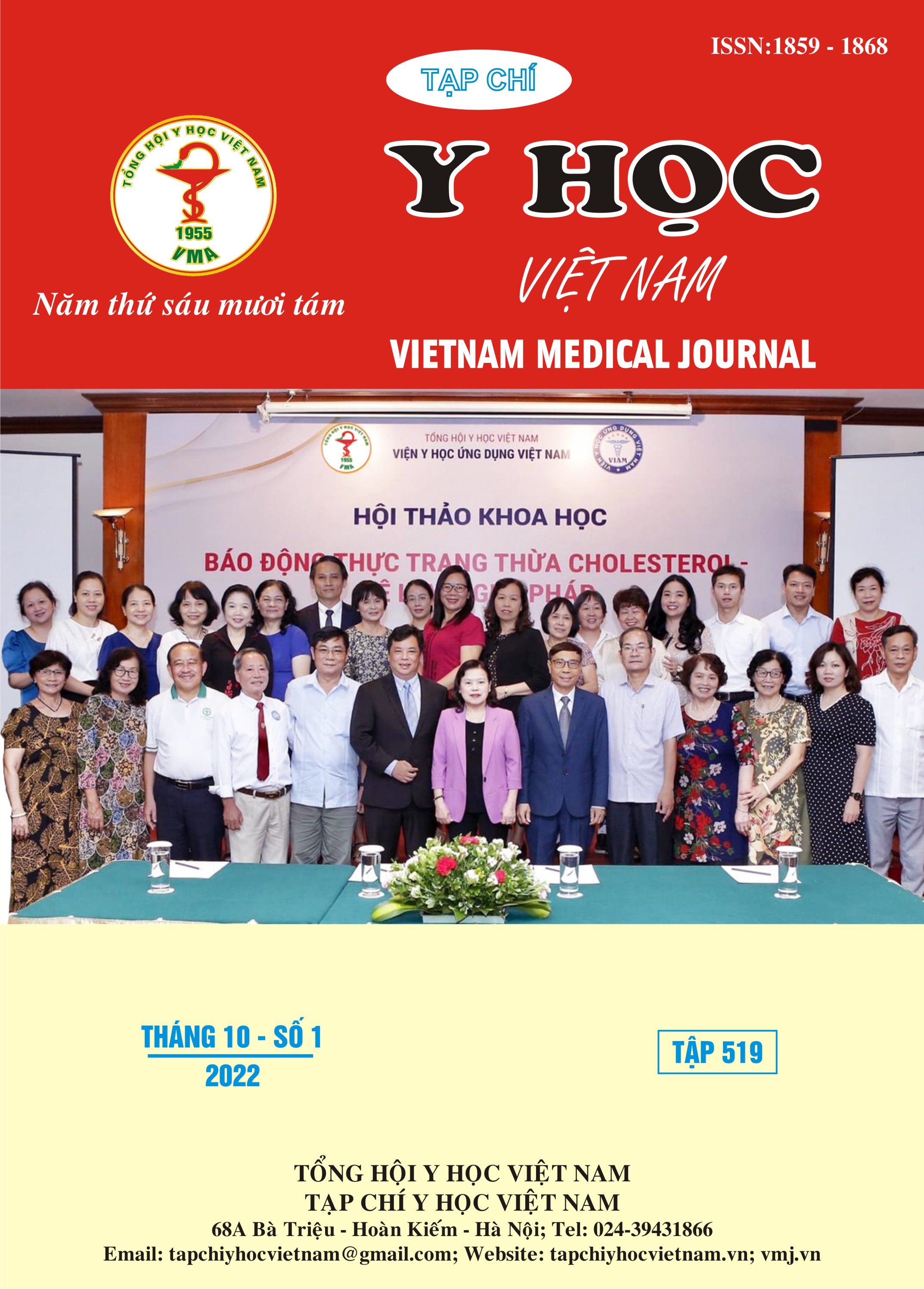ĐẶC ĐIỂM LÂM SÀNG RỐI LOẠN GIẤC NGỦ Ở NGƯỜI BỆNH THAY VAN TIM NHÂN TẠO
Nội dung chính của bài viết
Tóm tắt
Mục tiêu: Mô tả đặc điểm lâm sàng rối loạn giấc ngủ ở người bệnh thay van tim nhân tạo. Đối tượng và phương pháp nghiên cứu: Nghiên cứu mô tả cắt ngang 97 người bệnh thay van tim nhân tạo điều trị nội trú tại Viện Tim Mạch Quốc Gia – Bệnh viện Bạch mai từ tháng 11/2021 đến tháng 07/2022. Kết quả: Tuổi trung bình của đối tượng nghiên cứu là 58,8 ± 11,6; tuổi thay van tim trung bình là 52,3 ± 11,7, trong đó có 53,6% người bệnh nữ; tỷ lệ van tim sinh học và van tim cơ học lần lượt là 56,7% và 41,2% còn lại 2,1% người bệnh có cả van sinh học và cơ học. Có 58,8% người bệnh thay van tim nhân tạo có rối loạn giấc ngủ, trong đó khó duy trì giấc ngủ (94,7%) và khó vào giấc ngủ (84,2%) chiếm tỷ lệ cao nhất với thời gian đi vào giấc ngủ trung bình là 53,0 ± 28,1 phút, số lần thức giấc mỗi đêm là 3,0 ± 1,1 lần và thời gian đi ngủ lại sau khi thức trung bình là 20,6 ± 18,0, tiếp theo là thức dậy sớm buổi sáng chiếm 12,3% với thời gian dậy sớm trung bình là 13,3 ± 25,2 và không có người bệnh nào mất ngủ hoàn toàn. Hiệu quả giấc ngủ trung bình là 66,5 ± 12,7, điểm PSQI trung bình là 10,9 ± 3,4. Các biểu hiện ban ngày ở người bệnh có rối loạn giấc ngủ bao gồm mệt mỏi (100%), giảm tập trung (59,7%), căng thẳng, nhức đầu (29,8%), bồn chồn (28,1%), buồn ngủ quá mức (19,3%), chóng mặt (19,3%), run (12,3%). Kết luận: Rối loạn giấc ngủ là thường gặp ở người bệnh thay van tim nhân tạo, khó vào giấc ngủ và khó duy trì giấc ngủ là đặc điểm lâm sàng phổ biến. Các biểu hiện ban ngày là thường gặp và gây nhiều ảnh hưởng đến chất lượng cuộc sống ở người bệnh thay van tim nhân tạo.
Chi tiết bài viết
Từ khóa
van tim nhân tạo, rối loạn giấc ngủ, biểu hiện ban ngày
Tài liệu tham khảo
2. Dumesnil Jean G, Pibarot Philippe. Prosthetic Heart Valves. Circulation. 2009;119(7):1034-1048. doi:10.1161/CIRCULATIONAHA.108.778886
3. Kjersti O. Nearly one-quarter of patients say mechanical heart valve disturbs sleep. Cardiovascular Journal of Africa. 2017 Sep-Oct; 28 (5):330
4. Hedges C, Redeker NS, Ruggiero JS. Sleep Is Related to Physical Function and Emotional Well-Being After Cardiac Surgery: Nurs Res. 2004; 53(3):154-162. doi:10.1097/00006199-200405000-00002
5. Kammerlander A, Koschutnik M, Nitsche C, et al. Gender-specific differences in valvular heart disease. Wien Klin Wochenschr. 2020;132(3):61-68. doi:10.1007/s00508-019-01603-x
6. Andell P, Li X, Martinsson A, et al. Epidemiology of valvular heart disease in a Swedish nationwide hospital-based register study. Heart. 2017;103(21):1696-1703. doi:10.1136/ heartjnl-2016-310894
7. Hu XM, Huang DY, Wei WT, et al. The Assessment of Sleep Quality in Patients Following Valve Repair and Valve Replacement for Infective Endocarditis: A Retrospective Study at a Single Center. Med Sci Monit Int Med J Exp Clin Res. 2021;27:e930596-1-e930596-10. doi:10.12659/MSM.930596


